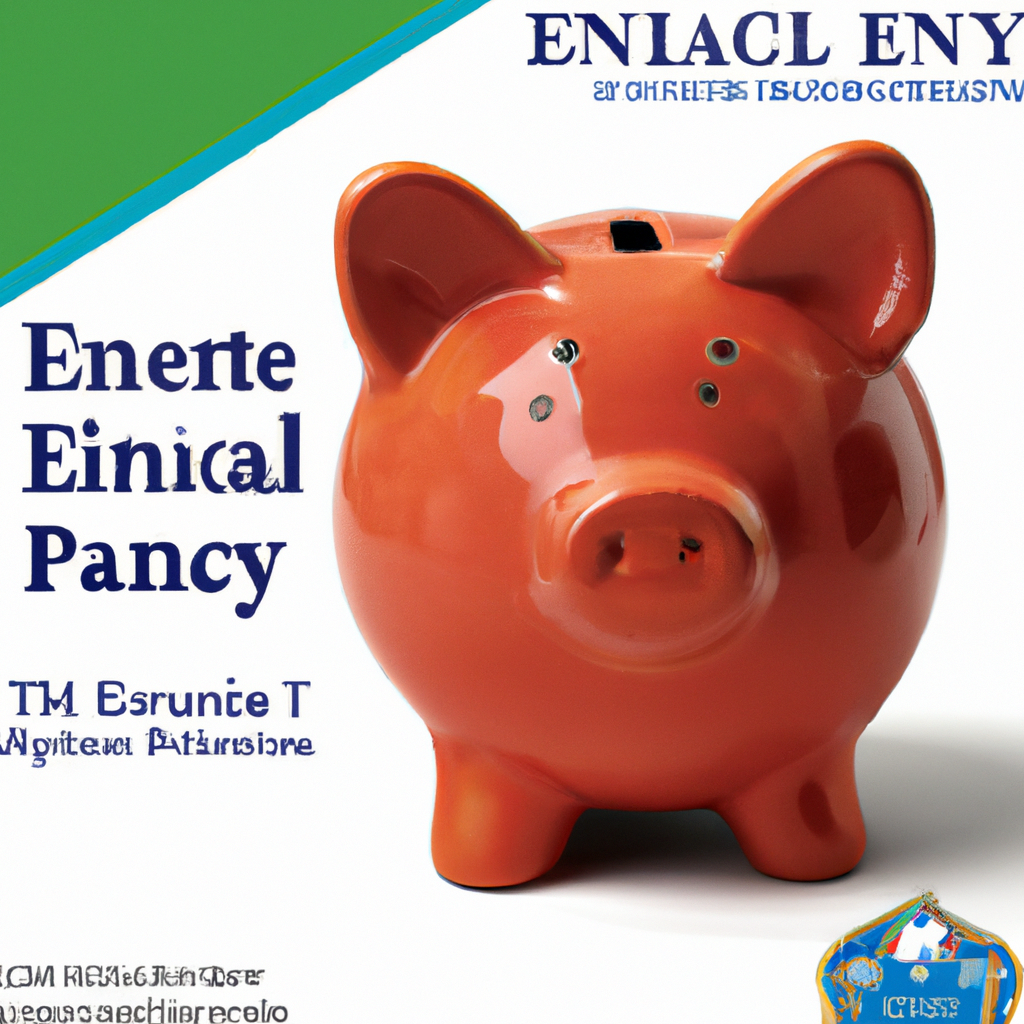Imagine a scenario where unexpected expenses arise – a sudden car repair or a medical emergency. Without an emergency fund, these unforeseen financial hurdles can leave you stressed and scrambling for solutions. That’s why it is essential to understand the importance of building an emergency fund and how it can provide you with financial security and peace of mind when facing unexpected circumstances. In this article, we will explore the reasons why an emergency fund is crucial and discuss practical strategies to start building one today.
1. Financial Security
Financial security is the foundation of a stable and worry-free life. It provides you with a sense of protection and peace of mind, knowing that you are prepared for any unexpected expenses or emergencies that may come your way. By establishing a robust financial security plan, you are taking proactive steps to safeguard your financial future and create a solid foundation for yourself and your loved ones.
1.1. Protection against unexpected expenses
Life is full of surprises, and not all of them are pleasant. Sudden car repairs, medical bills, or a major home repair can throw a wrench in your carefully planned budget. However, having a well-funded emergency fund can provide you with a safety net in such situations. By setting aside a portion of your income regularly, you can accumulate enough funds to cover these unexpected expenses, without having to rely on credit cards or loans.
1.2. Safety net during emergencies
Emergencies can strike at any time, jeopardizing your financial stability. Whether it’s an unexpected job loss, a natural disaster, or a family crisis, having a financial safety net can be a lifesaver. An emergency fund can help cover essential living expenses, such as rent, groceries, and utilities, during difficult times when your income is uncertain or reduced. It ensures that you and your family can maintain a certain level of stability and avoid falling into debt or financial hardship.
2. Importance of Planning
Planning is a crucial aspect of financial management, enabling you to anticipate future uncertainties and take a proactive approach towards building a secure financial future. By engaging in careful planning, you can make informed decisions, allocate resources wisely, and mitigate potential risks.
2.1. Anticipating future uncertainties
The future is full of uncertainties, and financial planning allows you to prepare for these uncertainties, minimizing their impact on your life. Planning enables you to foresee potential challenges, such as changes in employment or economic downturns, and develop strategies to navigate through them smoothly. By considering different scenarios and preparing for them in advance, you can reduce the financial shock and ensure greater stability regardless of what the future holds.
2.2. Proactive approach to financial management
Taking a proactive approach to financial management empowers you to take control of your financial well-being. Through careful planning, you can set specific financial goals, visualize the steps required to achieve them, and implement strategies to stay on track. By being proactive, you can make informed decisions, seize opportunities, and optimize your financial resources. This approach not only strengthens your financial security but also provides a sense of empowerment and control over your financial future.

3. Avoiding Debt
Debt can quickly become a burden, trapping you in a cycle of financial instability. By adopting a cautious approach towards credit and minimizing interest payments, you can reduce your reliance on debt and establish a solid financial foundation.
3.1. Limited reliance on credit
While credit cards and loans are useful tools when used responsibly, relying too heavily on credit can lead to financial stress and jeopardize your long-term financial security. By limiting your reliance on credit, you can avoid accruing excessive debt and maintain a healthier financial profile. Instead of immediately turning to credit to finance your expenses, aim to build an emergency fund and save for larger purchases, minimizing your need for borrowing.
3.2. Minimizing interest payments
Interest payments can eat into your budget and hinder your progress towards financial stability. By minimizing interest payments, you can effectively reduce your debt burden and maximize your available income for other essential expenditures or savings. Paying off high-interest debts first, such as credit card balances or payday loans, can help you save substantial amounts on interest in the long run. Minimizing interest payments not only aids in achieving financial security but also allows you to focus on building wealth and achieving your financial goals.
4. Managing Unexpected Situations
Life is full of unexpected twists and turns, which can have a significant impact on your financial well-being. Being prepared for various unexpected situations, such as job loss, medical emergencies, or home and car repairs, can help you navigate through these challenges without destabilizing your financial security.
4.1. Job loss or reduced income
Losing a job or experiencing a decrease in income can be both emotionally and financially draining. However, having an emergency fund can act as a buffer during such times, providing you with a temporary safety net to cover your basic expenses until you secure alternative employment. With a financial cushion in place, you can focus on finding new job opportunities and be selective in making the right career choices without succumbing to financial desperation.
4.2. Medical emergencies
Medical emergencies can strike when least expected, and the costs associated with healthcare can be substantial. By having an emergency fund, you can cover unexpected medical bills and ensure the well-being of yourself and your loved ones without having to resort to high-interest loans or sacrificing other financial goals. Your emergency fund will provide the financial agility needed to navigate through these difficult times and alleviate the stress associated with unexpected medical expenses.
4.3. Home or car repairs
Owning a home or a car comes with the responsibility of maintenance and occasional repairs. These expenses can be unpredictable and often come at the most inconvenient times. Whether it’s a leaky roof or a broken-down car, having an emergency fund allows you to tackle these unexpected repairs without derailing your financial plans. By being prepared, you can address these repairs promptly, ensuring the longevity and safety of your assets, while also avoiding the need for costly loans or sacrificing other financial priorities.

5. Peace of Mind
Financial stability and security contribute significantly to your overall well-being, providing you with peace of mind and reducing stress and anxiety. Knowing that you have the necessary resources to handle unexpected challenges and uncertainties can alleviate the financial burdens we often face in life.
5.1. Reduced stress and anxiety
Financial problems can be a significant source of stress and anxiety, impacting various areas of your life, including your health, relationships, and overall happiness. However, by actively building a solid financial security plan, you can reduce financial stress and enjoy a greater sense of calm and tranquility. Having confidence in your ability to handle unexpected expenses and emergencies allows you to focus on other aspects of your life without the constant worry of financial instability.
5.2. Confidence in facing unexpected challenges
When you have a strong financial foundation and an emergency fund in place, you can face unexpected challenges with confidence and resilience. Whether it’s a sudden economic downturn or an unforeseen crisis, you have the peace of mind that you are financially prepared to weather the storm. This readiness allows you to adapt to changing circumstances, make informed decisions, and maintain a positive outlook, even in the face of adversity.
6. Breaking the Cycle of Financial Instability
Building financial security helps break free from the cycle of financial instability, providing the opportunity to create a solid foundation and move away from living paycheck to paycheck.
6.1. Creating a solid foundation
Financial security lays the groundwork for a more stable and prosperous future. By focusing on building an emergency fund and reducing debt, you can establish a solid foundation that allows you to navigate through financial ups and downs with more ease. This solid foundation provides stability and paves the way for achieving your long-term financial goals, such as homeownership, retirement planning, or starting a business.
6.2. Breaking free from living paycheck to paycheck
Living paycheck to paycheck can be stressful and limit your financial options and opportunities. However, by prioritizing financial security and making conscious decisions about your spending and saving habits, you can break free from this cycle. By building an emergency fund and working towards reducing debt, you can gradually build a stronger financial position, allowing you to escape the paycheck-to-paycheck lifestyle and gain greater control over your financial future.

7. Independence and Flexibility
Building financial security provides you with greater independence and flexibility, empowering you to make choices aligned with your values and dreams.
7.1. Financial freedom to make choices
Having financial security provides you with the freedom to make choices based on your aspirations and priorities, rather than being forced into decisions due to financial constraints. It allows you to pursue your passions, take calculated risks, and seize opportunities that align with your long-term goals. Financial freedom opens up a world of possibilities and enables you to lead a more fulfilling and purposeful life.
7.2. Ability to seize new opportunities
Opportunities often come unannounced, and the ability to seize them can make a significant difference in your life. Whether it’s starting a new business venture, investing in a promising opportunity, or pursuing further education, having a strong financial foundation allows you to take advantage of these opportunities and propel yourself towards success. Financial security gives you the flexibility to make bold moves and explore new horizons without compromising your stability or security.
8. Setting Financial Goals
Setting financial goals is crucial for achieving long-term financial independence and building wealth. By setting clear objectives and working towards them systematically, you can align your financial decisions with your desired outcomes and create a roadmap towards a brighter financial future.
8.1. Short-term and long-term objectives
Financial goals can be categorized into short-term and long-term objectives. Short-term goals may include building an emergency fund, paying off high-interest debt, or saving for a significant purchase. Long-term goals, on the other hand, may encompass retirement planning, homeownership, or creating a college fund for your children. By clearly defining your short-term and long-term goals, you can allocate your resources effectively, track your progress, and stay motivated throughout your financial journey.
8.2. Building towards financial independence
Financial independence is the ultimate goal for many individuals. It represents the ability to support your desired lifestyle without relying on others or being constrained by financial limitations. By setting financial goals and consistently working towards them, you can gradually build towards financial independence. This may involve increasing your savings rate, diversifying your income streams, or investing wisely to grow your wealth over time. Financial independence provides you with the freedom to retire comfortably, pursue your passions, and live life on your own terms.
9. Reducing Family Stress
Financial stress can take a toll on not just your own well-being but also on your loved ones. By building financial security, you can provide for your dependents and alleviate the financial burdens they may face.
9.1. Providing for dependents
If you have dependents, such as children or aging parents, building financial security becomes even more critical. By having an emergency fund and a comprehensive financial plan in place, you can ensure that their needs are met, even in challenging times. Whether it’s supporting their education, taking care of medical expenses, or providing for their daily essentials, financial security allows you to be a reliable and supportive figure for your dependents.
9.2. Alleviating financial burdens on loved ones
Financial burdens can strain relationships and create unnecessary stress within families. By building a solid financial foundation, you can reduce the financial burdens on your loved ones and foster a more harmonious and supportive environment. Personal financial security not only benefits you but also extends to your family, ensuring that they are not burdened by your financial struggles or unexpected expenses. This sense of security can strengthen your relationships and allow you to focus on building meaningful connections and shared experiences with your loved ones.
10. Accumulating Wealth
Building financial security sets the stage for accumulating wealth and creating a brighter financial future. By effectively managing your finances and investing your surplus funds, you can grow your wealth over time, creating new opportunities and possibilities.
10.1. Investing surplus funds
Once you have built a strong financial foundation and have extra funds available, investing them wisely can be a key step towards long-term wealth accumulation. By diversifying your investments and seeking professional advice, you can make your money work for you and generate passive income. Investing surplus funds can help you build wealth more quickly and secure your financial future, ensuring financial stability for yourself and your loved ones.
10.2. Growing financial resources
As your financial security strengthens and your investments grow, you have the opportunity to expand your financial resources and create more wealth. By reinvesting returns, exploring new investment avenues, or even starting your own business, you can continue to grow your financial resources and move closer to achieving your dreams and aspirations. Accumulating wealth not only provides you with financial security but also empowers you to create a legacy and make a positive impact in the world around you.
In conclusion, building financial security is a vital component of a fulfilling and stress-free life. By protecting yourself against unexpected expenses, planning for the future, avoiding debt, managing unexpected situations, and setting financial goals, you can establish a strong foundation for yourself and your loved ones. The benefits of financial security extend beyond just the financial realm, offering peace of mind, independence, and the ability to seize new opportunities. By breaking the cycle of financial instability, reducing family stress, and accumulating wealth, you can create a brighter and more secure financial future for yourself and the ones you care about.

